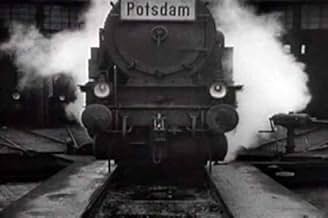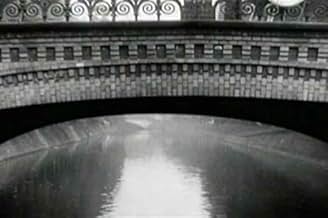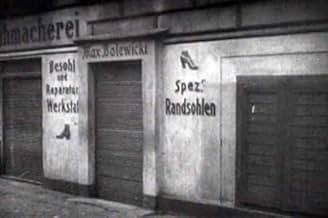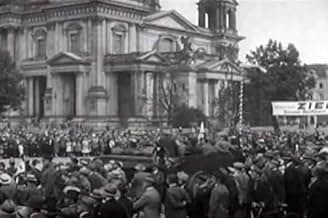Un día en la ciudad de Berlín, el ritmo del tiempo desde primera hora de la mañana hasta las profundidades de la noche.Un día en la ciudad de Berlín, el ritmo del tiempo desde primera hora de la mañana hasta las profundidades de la noche.Un día en la ciudad de Berlín, el ritmo del tiempo desde primera hora de la mañana hasta las profundidades de la noche.
- Dirección
- Guionistas
- Elenco
Paul von Hindenburg
- Self
- (sin créditos)
- Dirección
- Guionistas
- Todo el elenco y el equipo
- Producción, taquilla y más en IMDbPro
Opiniones destacadas
`Berlin, Symphony of a Great City' is a film I've watched over and over with fascination. I think it's true that it is not so much about the people of Berlin, although we see many of them, but the city itself as a huge living, breathing organism. Back in the 1930s filmmaker John Grierson apparently wrote that this film `created nothing,' and that it violated the first principles of documentary by showing us nothing of importance but beautiful images. Looking at it more than 70 years after its creation, however, its documentary value seems evident to me, at least. I find it fascinating just to see what the people, clothing, uniforms, vehicles, streets, parks, restaurants, shops, theaters, nightclubs, and factories looked like in that distant time and place. It's amazing to contemplate how soon this complex, sophisticated society would be consumed in the most primitive debauchery. Do these people really look that much different from those we see on our streets every day? It makes me wonder what we're all potentially capable of.
Some slight differences do seem apparent, however. When a fight breaks out in a public place today, people usually try to ignore it, or even duck their heads and run for cover. But in a scene where two men argue violently in the street, the Berliners of the 1920s crowd in close around the combatants, and even try to separate them and arbitrate the dispute, before a policeman moves in. Whether this was typically European at that time, or just typical of its era, I really can't say, but it seems strange to me today.
Although I think the majority of this film was shot in a candid manner, and looks it, it's obvious that not quite all of it was un-staged, as a previous commentator has pointed out. For example, look at the argument scene just mentioned. Considering one of the camera angles (probably from a 2nd floor window), the argument must have been staged at the exact spot where this camera could catch it, and the crowd's reaction, from above. In addition, a second camera was in place at street level to move in close, which hardly suggests a serendipitous event.
A good musical score is vitally important to bring this film to life. It's too bad the original score has been lost. It would be fascinating to know what it was like. But I think the one written by Timothy Brock for the Kino edition is superb in that it captures its changing moods and rhythms. If, as one internet reviewer commented, it seems a bit melancholy, that may be apropos considering that this beautiful city, and a great many of its inhabitants, would be consumed in fire less than 20 years later.
Some slight differences do seem apparent, however. When a fight breaks out in a public place today, people usually try to ignore it, or even duck their heads and run for cover. But in a scene where two men argue violently in the street, the Berliners of the 1920s crowd in close around the combatants, and even try to separate them and arbitrate the dispute, before a policeman moves in. Whether this was typically European at that time, or just typical of its era, I really can't say, but it seems strange to me today.
Although I think the majority of this film was shot in a candid manner, and looks it, it's obvious that not quite all of it was un-staged, as a previous commentator has pointed out. For example, look at the argument scene just mentioned. Considering one of the camera angles (probably from a 2nd floor window), the argument must have been staged at the exact spot where this camera could catch it, and the crowd's reaction, from above. In addition, a second camera was in place at street level to move in close, which hardly suggests a serendipitous event.
A good musical score is vitally important to bring this film to life. It's too bad the original score has been lost. It would be fascinating to know what it was like. But I think the one written by Timothy Brock for the Kino edition is superb in that it captures its changing moods and rhythms. If, as one internet reviewer commented, it seems a bit melancholy, that may be apropos considering that this beautiful city, and a great many of its inhabitants, would be consumed in fire less than 20 years later.
10J. Steed
Classic and splendid film that is still fascinating to watch. Walter Ruttmann did not make a documentary about Berlin, although 75 after date it certainly can be considered a document about a Berlin that is no more, he composed a film that tries to catch the essence of the atmosphere of a big city. The film is a good example of the art style Neue Sachlichkeit (functionalism): it is a cross-section of Berlin's life in which every element is equally important, shown without comment and in its totality it is the expression of the joy of Berlin's life. It is not a film about the life of Berliners, it is Berlin seen as a living mechanism.
The subtitle referring to Großstadt (big city) is the key, it could have been any other city. The idea as such is not the makers' prerogative. Elsewhere the fascination with the hustle and bustle of the big city was also present as was the idea to catch this on this film and in music: e.g. Cavalcanti in France made a film about Paris and the US Ferde Grofé composed his musical suite Metropolis (1927) with New York in his mind. The irony of all these endeavours is that the film or music is abstract, but that the result is a romanticizing view.
Ruttmann made several abstract film and he refers to them in the beginning with abstract horizontal lines dissolving to rail way tracks. In my view the rest of the film is also abstract. Although we see real people and situations the brilliant editing constantly keeps the film abstract: the situation and the people in a shot are not important, important is the juxtaposition to other shots: is the composition varied enough?. Thus we see a filmic composition (in stead of a musical one) and the subtitle Symphony is just. As with every composition the theme has to be modulated to keep it interesting and it is here where the weakness of the film is. The building up from the start and elaboration up to the beginning of the afternoon is splendid, precise and exiting; but from that point it bogs down for a while: we see another shop, another street etc. without adding much to what already was. It may be that Ruttmann was aware of this, note how quickly he finishes the afternoon to continue with the night-life and then immediately all the excitement and filmic fun is back.
In an 1939 interview cameraman Karl Freund said that everything possible was filmed using only candid cameras. I have my doubts. Let's take for example the sequence of the drowning lady: how could he make an extreme close-up with a hidden camera in such a brilliant angle? (By the way: if she really tried to commit suicide, was Freund himself not only one of the gaping bystanders without doing anything to save her?) How could he foresee the right angle to film the prostitute picking up her client near the cornered shop window? Not that it matters for the quality of the film, but it proofs the old adagium: filming is deceiving.
The subtitle referring to Großstadt (big city) is the key, it could have been any other city. The idea as such is not the makers' prerogative. Elsewhere the fascination with the hustle and bustle of the big city was also present as was the idea to catch this on this film and in music: e.g. Cavalcanti in France made a film about Paris and the US Ferde Grofé composed his musical suite Metropolis (1927) with New York in his mind. The irony of all these endeavours is that the film or music is abstract, but that the result is a romanticizing view.
Ruttmann made several abstract film and he refers to them in the beginning with abstract horizontal lines dissolving to rail way tracks. In my view the rest of the film is also abstract. Although we see real people and situations the brilliant editing constantly keeps the film abstract: the situation and the people in a shot are not important, important is the juxtaposition to other shots: is the composition varied enough?. Thus we see a filmic composition (in stead of a musical one) and the subtitle Symphony is just. As with every composition the theme has to be modulated to keep it interesting and it is here where the weakness of the film is. The building up from the start and elaboration up to the beginning of the afternoon is splendid, precise and exiting; but from that point it bogs down for a while: we see another shop, another street etc. without adding much to what already was. It may be that Ruttmann was aware of this, note how quickly he finishes the afternoon to continue with the night-life and then immediately all the excitement and filmic fun is back.
In an 1939 interview cameraman Karl Freund said that everything possible was filmed using only candid cameras. I have my doubts. Let's take for example the sequence of the drowning lady: how could he make an extreme close-up with a hidden camera in such a brilliant angle? (By the way: if she really tried to commit suicide, was Freund himself not only one of the gaping bystanders without doing anything to save her?) How could he foresee the right angle to film the prostitute picking up her client near the cornered shop window? Not that it matters for the quality of the film, but it proofs the old adagium: filming is deceiving.
Place: Berlin. Span: one day in the life of the city circa 1927 captured by the camera. We enter by train.
One way to watch this, the most obvious I guess, is as a historic document, a snapshot of life as it was once. The old world just barely impregnated with faint traces of an archaic modernity; street cars, neon signs, busy streets, things we have now but were then just beginning to greet people. So with this mindset, as a museum piece that depicts an old version of our world.
This is fine, but I urge you to engage it differently if you can.
What if instead of merely observing exhibits from behind a glass panel, we get out from the museum into actual life? Instead of settling in for this as a historic - meaning dead, embalmed, academic - glimpse, we invigorate it with life that we know, with sunlight, texture, sound, breath that was then as real as it is now? How would it be in absolute stillness to feel present in the middle of a modern life?
This is how the film was intended after all, it's plainly revealed this way. Not a fossil for generations of curious tourists from the future, but a celebration of life 'now', modern, busy life out the window.
So no longer an old world that faintly reminds us of our own, but a new world, exciting, alluring, mysterious, alive with myriad possibilities. New things everywhere, novel pathways to travel, environments to experience. What I mean is, try to see the city as though you just got off the train and were visiting for the first time. It ends with the camera spinning around a flashing neon sign cut to match with fireworks erupting in the night sky.
I urge you to inhabit this, settle for nothing less. Let its neon flowers blossom in you.
One way to watch this, the most obvious I guess, is as a historic document, a snapshot of life as it was once. The old world just barely impregnated with faint traces of an archaic modernity; street cars, neon signs, busy streets, things we have now but were then just beginning to greet people. So with this mindset, as a museum piece that depicts an old version of our world.
This is fine, but I urge you to engage it differently if you can.
What if instead of merely observing exhibits from behind a glass panel, we get out from the museum into actual life? Instead of settling in for this as a historic - meaning dead, embalmed, academic - glimpse, we invigorate it with life that we know, with sunlight, texture, sound, breath that was then as real as it is now? How would it be in absolute stillness to feel present in the middle of a modern life?
This is how the film was intended after all, it's plainly revealed this way. Not a fossil for generations of curious tourists from the future, but a celebration of life 'now', modern, busy life out the window.
So no longer an old world that faintly reminds us of our own, but a new world, exciting, alluring, mysterious, alive with myriad possibilities. New things everywhere, novel pathways to travel, environments to experience. What I mean is, try to see the city as though you just got off the train and were visiting for the first time. It ends with the camera spinning around a flashing neon sign cut to match with fireworks erupting in the night sky.
I urge you to inhabit this, settle for nothing less. Let its neon flowers blossom in you.
Berlin: City Symphony is one of those early experiments in montage - early as in before sound was invented and right after Battleship Potemkin changed everything. It's not always montage, as some might believe from its recommendations (i.e. Koyannasquati), as the director Walter Ruttmann is making documentary as much as city-scape. It's about a full day and night among the dwellers and the objects of a city: the moving trains, the people shuffling by about their various concerns, and the people at jobs and things like a factory at work and phones being answered used for editing fodder.
Some of this is dazzling work, cut and speed up to reflect a mood of a city that is vibrant and hectic, imaginative and crazy, and sometimes tending for the dramatic. Ruttmann also has a rather weird design with the pacing at times; a woman in one 'scene' looks over a river, and in a state of sorrow falls over. People rush over to see what has happened, and we see a shot of the water and the woman gone under... and then it cuts right away to a beauty pageant! It throws a viewer off to see Ruttmann's unconventional choices, and how images flow together like the racers (cars, horses, people, boxcars), and there develops a simple but engrossing poetry of people as "actors" in front of a camera on their daily travels or having fun like at the funshow in the auditorium. It's not always as exciting or delirious as a Russian counterpart like Man with a Movie Camera or Kino Eye, but it pays loving tribute to its city at its time and place, showing the light with the dark, the commonplace with the unusual.
Some of this is dazzling work, cut and speed up to reflect a mood of a city that is vibrant and hectic, imaginative and crazy, and sometimes tending for the dramatic. Ruttmann also has a rather weird design with the pacing at times; a woman in one 'scene' looks over a river, and in a state of sorrow falls over. People rush over to see what has happened, and we see a shot of the water and the woman gone under... and then it cuts right away to a beauty pageant! It throws a viewer off to see Ruttmann's unconventional choices, and how images flow together like the racers (cars, horses, people, boxcars), and there develops a simple but engrossing poetry of people as "actors" in front of a camera on their daily travels or having fun like at the funshow in the auditorium. It's not always as exciting or delirious as a Russian counterpart like Man with a Movie Camera or Kino Eye, but it pays loving tribute to its city at its time and place, showing the light with the dark, the commonplace with the unusual.
This is a very straightforward and pleasant silent picture that delivers exactly what it promises. Namely: footage of Berlin, its residents, and the whole spectrum of city activities during an ordinary day in 1927. If you have any interest in seeing real life in Weimar Germany, this film is an excellent rental. It opens with an Eisensteinian-style montage sequence, as a train approaches the city. Upon its arrival in Berlin's Union Station, the city is remarkably desolate. As the film progresses, the city begins to wake up, and you are shown residents at work (mostly in factories) and leisure. You will see shopkeepers, businessmen, restauranteurs, policemen, soldiers, politicians; children at play and even some vagrants. The acts become gradually more harsh as the film progresses, with mildly unpleasant imagery beginning to creep in (e.g. shots of dogs fighting, footage of beggars, litter, an arrest, etc.), only to gracefully recede as the film reaches its closing. The final act shows Berlin's night life, which is as lavish and swinging as anything in our own "Roaring 20's." This is an impeccable time capsule and it has something to offer both film and history buffs. Berlin was truly a world city at this time, and it was extremely interesting to see everything in the Weimar's Golden period, before Hitler and the destruction that followed. Technically speaking, it is a very well made and restored film; the footage is crisp and the music was never overwhelming. This is a really easy film to appreciate and it is definitely worthwhile, particularly for history buffs. Highly recommended. ---|--- Reviews by Flak Magnet
¿Sabías que…?
- TriviaThe shooting was done over 18 months though the resulting feature gives the impression of just one day in the city.
- ConexionesFeatured in Lulu in Berlin (1984)
Selecciones populares
Inicia sesión para calificar y agrega a la lista de videos para obtener recomendaciones personalizadas
- How long is Berlin: Symphony of Metropolis?Con tecnología de Alexa
Detalles
- Fecha de lanzamiento
- País de origen
- Idioma
- También se conoce como
- Berlin: Symphony of a Metropolis
- Locaciones de filmación
- Berlin Cathedral, Mitte, Berlín, Alemania(aka Berliner Dom)
- Productoras
- Ver más créditos de la compañía en IMDbPro
- Tiempo de ejecución
- 1h 5min(65 min)
- Color
- Mezcla de sonido
- Relación de aspecto
- 1.33 : 1
Contribuir a esta página
Sugiere una edición o agrega el contenido que falta








